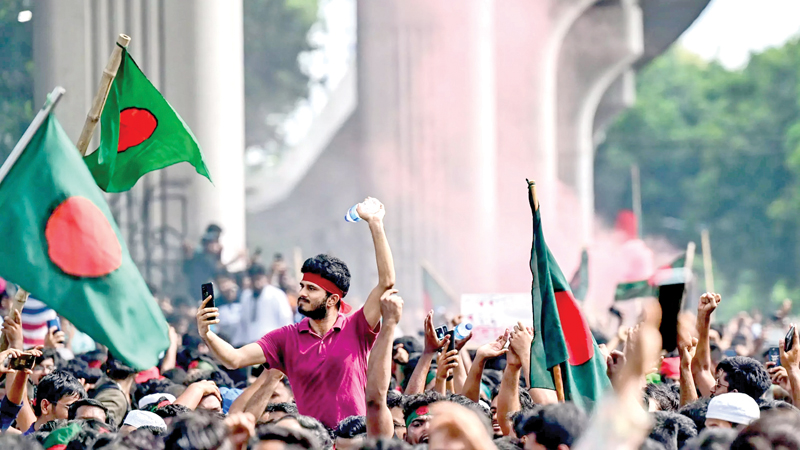The macabre sense of violence filled with gory killings and purging of government officials in broad daylight in every nook and corner of Bangladesh since the complete collapse of Sheikh Hasina’s government reminds us of the prophetic words of Thomas Hobbs, who summed up human nature as “solitary, poor, nasty and brutish”.
The trajectory that augmented the chaos in Bangladesh was not surprisingly rooted in a deeper economic crisis as it happened in neighbouring Sri Lanka in 2022, where the long petrol ques, shortage of foreign reserves and ten hours of power cuts agitated the embittered folks to launch protest movements across the island, which finally ended up in ousting the President Gotabaya Rajapaksa.
Unlike the deteriorated economy that encompassed Sri Lanka, the Bangladesh economy continued to thrive by leveraging the country’s capacity as the second-largest economy in South Asia. Condescending remarks of Henry Kissinger, who called the young nation a basket case in the advent of Bangladesh in 1971 became disproven when the country celebrated its 50th anniversary as a nation-state in 2021 due to unprecedented economic success attained over the past few decades.
It is indeed a stark surprise to fathom how Bangladesh fell from grace as the riots that arose from the student movements across Bangladesh initially lacked the enthusiasm to topple the government. The apparent reasons for the protests were mainly related to the Supreme Court’s judgment in June to reinstate a 30 percent quota for the descendants of the freedom fighters of 1971, which reversed the government decision in 2018 in response to the students’ protests. The same modus operandi adopted by the protesters in Sri Lanka through their famous aragalaya or “Gota go home” movement became effective in the initial stage of the protests across Sri Lanka in July. Yet the euphoric feelings among the student activists were short-lived by the violence unleashed upon them which resulted in many deaths. From a vantage point, state violence was the paramount factor that differentiates Bangladeshi protests from Sri Lanka.
Aragalaya and ethnic pluralism
In several instances, the ubiquitous abhorrence of the masses towards President Gotabaya Rajapaksa and the Rajapaksa family turned violent as a spontaneous reaction to the government oppression, but all in all the entirety of the protests were confined to public demonstration of their antipathy. Above all, Sri Lankan aragalaya manifested a plurality of society that represented all the ethnic communities who sincerely demonstrated their aversion.
In the peak of the protest in 2022 July, the aragalaya protestors stormed into the Presidential palace in Colombo and occupied it for a few days until order was restored by the incumbent President Ranil Wickremesinghe. What marred the solidarity of the public rising of Bangladesh was its anarchic nature and the cruelty imposed by the government upon its own people.
Realist Morgenthau writes “The individual may say to himself….Let justice be done, even if the world perish, but the state has no right to say so in the name of those who are in its care”. The apathy of Hasina’s government in tolerating people’s inherent right to protest and her brutal oppression expedited the end of her regime. The Sri Lankan situation was a milder one compared to Hasina’s despotism and it may have been rooted in Sri Lanka’s undiluted democracy and the strength of its institutions. Mainly the civil society network across the island and the state bureaucracy played a major role in impeding Sri Lanka from a complete disaster.
Communal disharmony
It has been conspicuously visible that the cause of events emerging after the fall of Hasina’s government is akin to racially motivated violence, in which the initial gravitational force, the students of the country are cornered by the sudden influx of Islamic radicals. The reported lootings and setting of fire on the Hindu shrines in the aftermath of Hasina’s departure are emblematic of the new dynamics of Islamic radicalism, which can drag the whole country to a more uncertain juncture. One of the striking features of the protests that occurred in Sri Lanka in 2022 was they never intended to generate communal violence across the island as the protesters only wanted to defeat the common foe, the Rajapaksa regime.
This does not exactly mean that Sri Lanka is not susceptible to a series of communal disharmony as the island’s history was often marred by ethnic tensions in the post-independent context. Yet the public anger that arose during Gotabaya Rajapaksa’s administration jettisoned the communal feelings that pervaded the Sinhalese society as all the communities in Sri Lanka were gutted by the economic hardships.
Thus, the aragalaya in Sri Lanka did not prompt the Bangladeshi-styled communal disharmony, which eventually spared the island from turning into an Armageddon. On the whole, Sri Lanka’s survival from its complete chaos is attributed to the political acumen of President Ranil Wickremesinghe, who faced his finest hour as a mature statesman. After taking complete control of the military and the state apparatus, Wickremesinghe guaranteed protection for all the politicians, which increased his credibility. It became further bolstered by his closer rapport with India as he made a shift from his predecessor’s pro-Chinese stances. Contrary to the Sri Lankan experience in 2022, Bangladesh lacks a truly organised democratic outlook in the protests and its detrimental outcome is visible from the recent communal violence against the Hindus.
(The writer is a lecturer at the Faculty of Law, General Sir John Kotelawala Defence University)









